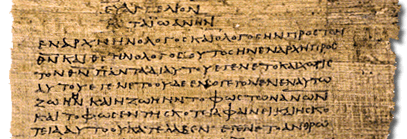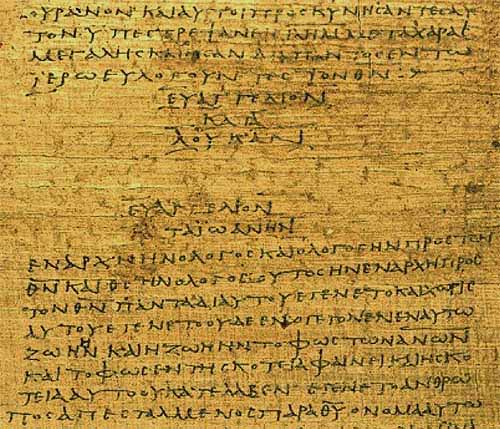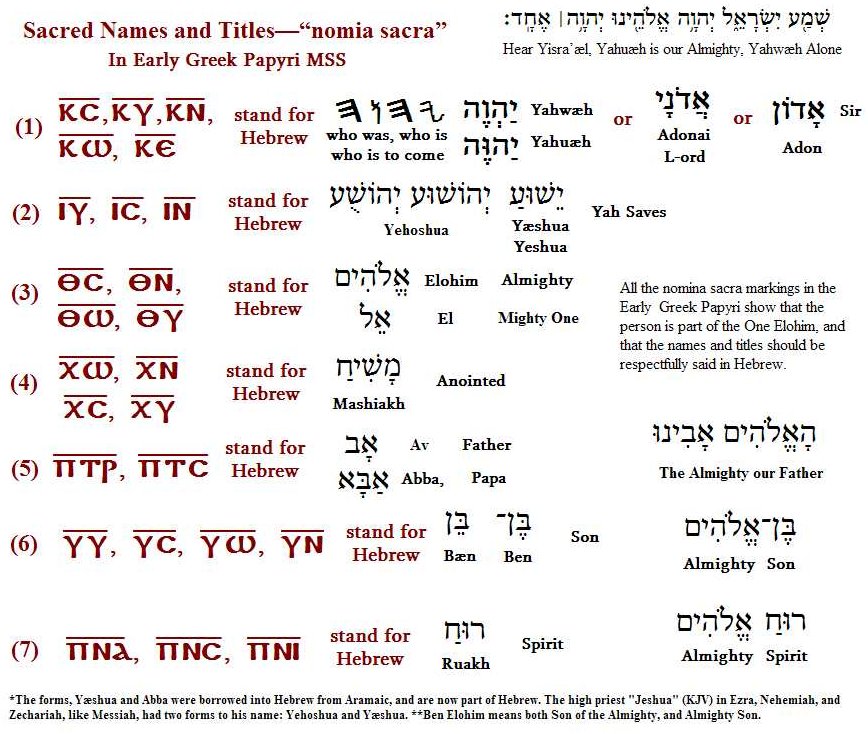Also, Gadar Perets, there is one more thing I would add concerning capitalization at this point, (because it concerns the same source, Papyrus Bodmer P75). A case for the possibility of early capitalization, (as opposed to Nomina Sacra only), can be made from the same manuscript mentioned above and that also right out of the same passage from the opening lines of the Gospel of John. Here is a larger image file from a different source:
(Image file is linked under "P. Bodmer XIV, XV", Manuscript P75)
http://bibletranslation.ws/manu.html
At the end of John 1:4 the word
ΑΝΘΡΩΠΩΝ is contracted and overlined as
Α̅Ν̅Ω̅Ν.
ΤΩΝ ΑΝΘΡΩΠΩΝ thus becomes
ΤΩΝ Α̅Ν̅Ω̅Ν.
However this contraction occurs at the end of a line of script. The question therefore arises: was it done here because of space as has been postulated by some in the overall argument as one of the reasons for the "Nomina Sacra"? If it was done to save space in this instance then why not do the same two lines down where we see
ΑΝΘΡΩΠΟϹ fall into the same exact line position as
ΑΝΘΡΩΠΩΝ? And yet here
ΑΝΘΡΩΠΟϹ is written out in the full
plene form rather than a contracted, abbreviated, overlined form. Moreover the word in this case also does not fit the space, and is broken off, and then continued in the beginning of the next line of script. This strongly implies that the scribe and/or his exemplar, which he is copying, view
ΤΩΝ ΑΝΘΡΩΠΩΝ as needing to be capitalized while
ΑΝΘΡΩΠΟϹ is fully written out in
plene form even though it also fell at the end of a line, in the same position as the contracted
ΑΝΘΡΩΠΩΝ, (Α̅Ν̅Ω̅Ν), and had to be broken off onto the next line of script. Therefore in this case the scribe and/or his exemplar does not contract
ΑΝΘΡΩΠΩΝ to save space but rather for some other reason. Yet clearly anthropos and its forms are not sacred names, (which is the implied meaning of Nomina Sacra). It seems the only real reason for this particular occasion is merely for capitalization purposes. This rationale can only come from the meaning of the words and their usage within their contexts. In John 1:4 the author is clearly speaking of Man in the sense of Mankind, (which seems a legitimate reason to see a need to capitalize "Man" or "Mankind"). However, in John 1:6,
ΑΝΘΡΩΠΟϹ speaks of a single man, that is Yochanan the Immerser, and in that instance
ΑΝΘΡΩΠΟϹ is anarthrous, (without the definite article, "a man"), just as is
ΘϹ in John 1:1c.
John 1:4-6
4 In Him was life, and the life was the light of Mankind (ΤΩΝ Α̅Ν̅Ω̅Ν).
5 And the light shines in the darkness, and the darkness cannot overcome it.
6 There was a man, (ΑΝΘΡΩΠΟϹ), sent from Elohim, whose name was Yoḥanan.
We find the same practice becoming prevalent when it comes to "the son of Man", where huios, (son), is not often contracted while anthropou is quite often contracted and overlined. This anomaly coupled with the point concerning anthropos shows that the assumptions posted by the OP are just that: assumptions, (based primarily on already held doctrines). It is telling that the image file which the OP has posted makes no mention the anthropos contractions, (which are manifold), for anthropos cannot be thought of as deity, as the OP has suggested is the case with the term Nomina Sacra, so the fact that anthropos is so often contracted was simply left out of the image file, (selection bias). In the readings containing "the son of Man" the phrase was apparently not necessarily understood so much as a title insomuch as "Man" or "Mankind" was viewed as needing to be capitalized. There have been statistical studies done showing that huios was not early on considered to be part of the Nomina Sacra, (as opposed to what the OP says in his image file chart). Both P66 and P75 have a low rate of contraction when it comes to this word and those contractions appear to have been spurious, (simply meaning we do not understand the reason and it appears random). Speaking of Bodmer P75 the author of the following short study linked below says this:
"As regards
υιος only 12/56 sacred and 2/25 mundane occurrences are contracted. In the phrases ‘Son of man’ and ‘Son of God’,
υιος is mostly written
plene (80). The complete absence of theological or interpretive contraction can be seen in that the scribe is not averse from ignoring the need for contraction in clear sacred context."
http://www.academia.edu/6423187/Charlesworth_Consensus_Standardization_Nomina_Sacra_Aegyptus
This is in stark contradiction to what the OP's image file suggests under #6 on his chart:
Who even goes so far as to state, "nomina Sacra, i.e. as deity", which is nothing more than speculation, just as most all of this is also speculation to begin with. But some speculation is better than other speculation I suppose, and that is pretty much it, so take everything with a grain of salt, (or two).

.
.







 Thanks!
Thanks!